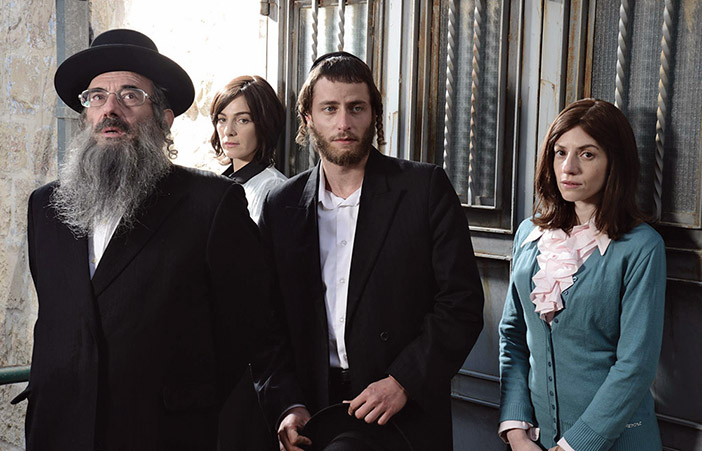

From Yerushalayim to Tel Aviv, from Haifa to Eilat, Saturday night at 10 p.m. has found Israelis of all stripes and affiliations riveted to their TVs (or their neighbors’) watching the latest episode of the hit series “Shtisel. ” For two seasons, and 24 episodes, the engaging and highly awarded YES television show was “the talk of the town.”
When co-creators and writers Yehonatan Indursky and Ori Alon sat down in 2013 for a chat at a Geula restaurant whose menu offered “heimishe” fare such as slabs of gefilte fish, weekday cholent and kishke, little did they imagine that the name of the establishment would lead their venture to fame and critical success. “We met at the Shtisel restaurant and said to ourselves, ‘It doesn’t matter what we’ll write, but this will be the name.’ It just sounded right,” said Indursky.
Tel Aviv resident Indursky was born into an ultra-Orthodox family in Jerusalem’s Givat Shaul neighborhood. He studied at the illustrious Ponevez Yeshiva in Bnei Brak, about which he wrote his first series, “Ponevez Time.” From there his journey led him to study at Jerusalem’s Sam Spiegel Film and Television School. “Our plan was to create a true, clear-eyed view of what ultra-Orthodox life is really like, the Haredi world that I love,” Indursky shared with the Times of Israel. Co-writer and creator Alon also hails from a Haredi background. Musically talented as well, Alon’s niggun (musical piece) created for the series is now a popular selection at Haredi simchas to the delight of Alon and Indursky.
For Alon Zingman, the secular director of the series, the phenomenon of the “Shtisel” niggun surfacing at Haredi events indicates how the series “has become a mouthpiece for the ultra-Orthodox world.” At first a bit nervous about venturing into the Haredi world, Zingman now sees the dramatic series as part of the new trend of creating TV shows that are likened to films, offering the possibility of doing something very meaningful by bringing a little theater to TV, not unlike “The Sopranos” and “Mad Men.”
For those who are not as yet initiated into the Shtisel world, the story revolves around the fictional Shtisel family living in a Haredi Jerusalem neighborhood. Patriarch Shulem Shtisel, a melamed (teacher) at a local cheder (religious school), was recently widowed and lives with his single son, Akiva, who is frustrated by his desire to pursue his artistic inclinations while realizing that they are unsuited to his world. Akiva’s life is further complicated by the pressure being exerted upon him by well-meaning shadchanim (matchmakers) and relatives who just don’t chap (grasp) what he wants.
The extended Shtisel family includes the charming Bubby (grandmother) placed into an assisted living facility only to discover TV and soap operas. She quickly becomes addicted to her TV shows and even recites tehillim for the soap opera characters. She brings ample comic relief to the series through her conversations with her children and grandchildren and co-resident, a former embittered rebbetzin.
Shulem’s married daughter has serious baggage of her own as her husband leaves the family to go off to a job in Argentina and somehow veers “off the derech.” Their young teenaged daughter reacts to the turmoil in her family by impulsively marrying a young yeshiva student to help him concentrate on his learning.
Each episode is a gem of family relations and emotions all within the confines of the Haredi world.
According to director Zingman, “Shtisel” differs from films that have touched upon Israel’s ultra-Orthodox society. Early Haredi films bring in characters from outside the community who ultimately change the thinking of the community. “Shtisel” is the first time that a television show depicts Haredim who love their way of life, their kids and grandkids. Their religious practice is not an issue at all. There are regular issues for them; they fall in love, they live their lives.
The cast of the series includes many well-known actors on the Israeli TV and film scene. Zohar Strauss, who plays Lipa Weiss, Shulem’s problematic son-in-law, has a large following from his performance in “Srugim,” another very popular Israeli TV series dealing with the singles scene in Nachlaot, Jerusalem. At a recent program featuring a sampling of the episodes followed by a conversation with some of the actors, Strauss, with the consensus of the others, expressed how positively impacted they were by acting in the series and how their views and opinions of the ultra-Orthodox had changed for the better, how truly respectful they had become of the Haredi way of life.
In preparation for their roles, the actors spent three weeks observing the Haredi community in Geula and Mea Shearim. Needless to say, they were as discreet as possible as they sat at bus stops, visited eateries, walked the streets in tourist attire and shopped in local stores. Tremendous time and effort went into getting the exact costumes – hats, glasses, beards – and body language – stride, eating mannerisms. What is truly amazing is the “geshmakt” (flavorful) Yiddish that the characters were able to inflect into their dialogue.
Avid fans, such as this writer, are eager for the next season of episodes, which we are told is in the works. In the interim, it has been announced that “Friends” co-creator Marta Kaufman has purchased the series for US adaptation. Zingman is personally conflicted as to whether “Shtisel” could be properly translated into an American setting “given the vast differences between Israeli and American Haredi lifestyles. It can only be in Jerusalem, not even Bnei Brak. The Shtisels have a singular language; they’re a specific type of Jerusalem Haredi family.”
“Shtisel” is available for purchase on Amazon with English subtitles. The Hebrew version can be downloaded online for free.
By Pearl Markovitz










